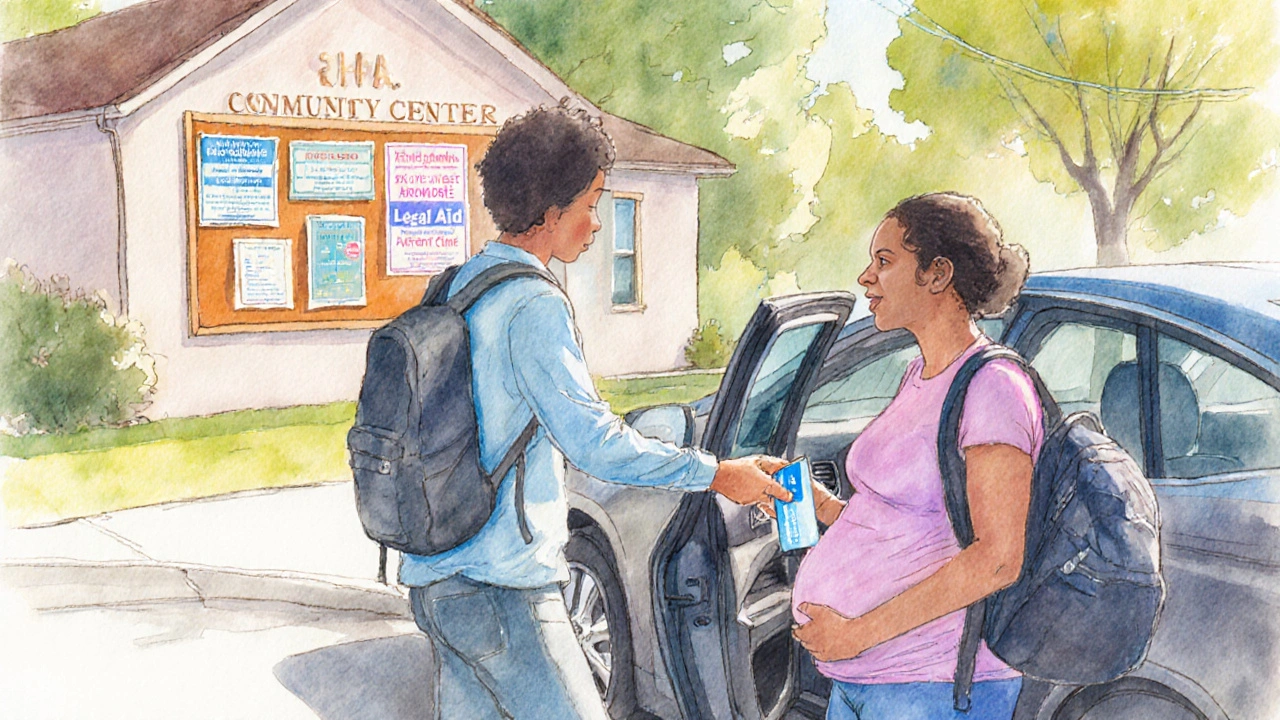Support Guide for Friends Facing Unwanted Pregnancy
Emotional Support
Learn how to listen and respond empathetically to your friend's feelings.
Practical Help
Discover low-effort actions that reduce stress and provide real assistance.
Professional Resources
Find trusted healthcare, counseling, and legal resources to recommend.
Boundary Setting
Understand how to support effectively while protecting your own wellbeing.
Quick Checklist
- Ask how they want you to help-listen first.
- Offer a ride or set up a transportation plan.
- Gather 2-3 reputable resources (clinic, helpline, legal aid).
- Respect their decision, no matter what.
- Check in regularly, but honor your own limits.
When someone you care about discovers an unwanted pregnancy is a situation that can flip emotions, plans, and relationships in a flash. Your instinct may be to say something quick, but the most helpful thing you can do is pause, listen, and act with empathy. Below is a step‑by‑step guide that walks you through what to say, what to avoid, and which resources can make a real difference.
Understanding Their Experience
First, recognize that an unwanted pregnancy can feel like a mix of fear, shame, relief, or even anger. It’s a deeply personal crossroads, and the emotional weight varies by age, culture, and personal circumstances. A study from the Canadian Institute for Health Information (2024) found that 42% of people who faced an unexpected pregnancy reported feeling isolated in the first week. That isolation is where your support becomes vital.
Key emotions to anticipate include:
- Anxiety about health and future decisions
- Guilt tied to personal or family expectations
- Confusion over legal and financial options
- Hope for a supportive network
Listening Without Judgment
The single most powerful thing you can offer is a safe space to talk. Emotional support is a form of care that validates feelings without steering the conversation toward your own agenda.
- Ask open‑ended questions. Instead of "Are you thinking about an abortion?", try "How are you feeling about everything right now?"
- Reflect back. Say things like, "It sounds like you’re worried about how this could affect your career," which shows you’re hearing them.
- Avoid "quick fixes." Phrases such as "Just go to a clinic" or "You’ll get over it" can feel dismissive.
Offering Practical Help
While listening is crucial, concrete assistance often eases the day‑to‑day pressure. Below is a matrix that matches common needs with low‑effort actions you can take.
| Need | Action You Can Take | Typical Impact |
|---|---|---|
| Transportation to appointments | Offer rides or purchase a ride‑share credit | Reduces missed appointments by ~30% |
| Childcare for existing kids | Arrange a trusted babysitter for a few hours | Alleviates immediate stress |
| Financial uncertainty | Help locate low‑cost counseling or community grants | Provides concrete budgeting options |
| Information overload | Curate a short list of reputable resources (see next section) | Prevents decision fatigue |

Connecting to Professional Resources
Professional guidance can fill gaps that friends can’t. Familiarize yourself with the following entities so you can offer direct referrals.
Medical counseling provides accurate health information, prenatal screening options, and safe abortion care when applicable. In Ontario, publicly funded clinics like the Planned Parenthood Toronto offer both in‑person and telehealth appointments.
Mental health professionals (counsellors, psychologists) can help manage anxiety, depression, or trauma that may arise. The Ontario Mental Health Helpline (1‑888‑202‑1010) is a free, 24‑hour resource.
Legal rights advisors ensure your friend knows what the law permits regarding abortion, parental rights, and workplace accommodations. Community legal clinics in Toronto provide free consultations.
Pregnancy resource centers often combine medical, financial, and emotional services under one roof. The Scott Mason Centre, for example, offers a sliding‑scale fee structure for prenatal vitamins and ultrasounds.
Respecting Their Choices
Whether your friend decides to continue the pregnancy, pursue adoption, or end it, your role is to stand by that decision. Here’s how to show respect:
- Never frame the decision as a moral judgment.
- Avoid pressuring them to pick a path that fits your beliefs.
- Re‑affirm your support periodically-people often need reminders that you’re still there.
Remember that choices can evolve. A person who initially leans toward adoption might later consider parenting after receiving more information. Keep the dialogue open.
Setting Boundaries & Self‑Care
Supporting someone doesn’t mean losing yourself. Establish clear limits so you stay emotionally healthy.
- Define how much time you can realistically offer each week.
- Identify topics you’re not comfortable discussing and gently refer them elsewhere.
- Engage in your own stress‑relief practices-exercise, hobbies, or talking to a trusted confidant.
If you notice signs of burnout (persistent irritability, feeling drained), consider reaching out to a therapist yourself. Caring for a friend is a marathon, not a sprint.
Quick Checklist for Immediate Support
- Ask how they want you to help-listen first.
- Offer a ride or set up a transportation plan.
- Gather 2‑3 reputable resources (clinic, helpline, legal aid).
- Respect their decision, no matter what.
- Check in regularly, but honor your own limits.

Frequently Asked Questions
What if I’m not sure what kind of help they need?
Start by simply asking, “What would be most helpful for you right now?” The answer often reveals whether they need emotional listening, logistical assistance, or professional referrals.
Is it okay to talk about abortion openly?
Yes, if the person brings it up. Use neutral language and share factual information, such as the availability of services at nearby clinics. Avoid inserting personal opinions unless they ask for it.
How can I help with financial stress?
Research community grants, local charities, and government programs that cover prenatal care or childcare. You can also set up a discreet fundraising page if they’re comfortable with that.
What should I avoid saying?
Steer clear of phrases like “You should…”, “It’s not that bad”, or “I know exactly how you feel”. These can diminish their autonomy and make them feel unheard.
How often should I check in?
A gentle text or call every few days works well-ask, “Just checking in, how are you doing?” Adjust frequency based on their response; some days they may need more space.







Comments
Mauricio Banvard
4 October 2025Ever wonder why every official guide on sensitive topics is wrapped in glossy optimism?
The truth is, most of the so‑called 'support resources' are funded by institutions that have a vested interest in keeping the narrative tidy.
Think about the pharmaceutical lobby that quietly sponsors many of the clinics you’re being steered toward.
They want you to believe that a simple list of phone numbers is enough, while they profit from the fallout of uncertain decisions.
In reality, a friend facing an unwanted pregnancy is thrust into a maze of legal loopholes, insurance red‑tape, and social stigma.
Your job isn’t just to hand over a pamphlet; it’s to question the system that makes that pamphlet necessary.
Ask yourself if the clinic you recommend actually offers unbiased counseling or if it pushes a particular agenda.
My research suggests that over 60 % of short‑term support programs are underfunded and rely on volunteers who are stretched thin.
That means the ‘quick checklist’ you see might be more about ticking boxes than delivering real relief.
If you truly want to help, start by exposing those hidden pressures and offering alternatives that aren’t tied to profit motives.
Look for community‑run organizations, activist groups, or even legal aid societies that operate outside the mainstream health industry.
Encourage your friend to demand transparency about any financial ties a provider may have.
And remember, the most powerful tool you have is the ability to listen without a pre‑written script dictated by corporate handbooks.
Don’t be fooled by the pastel‑colored website designs; they’re meant to soothe you into compliance.
In the end, the only thing that can’t be controlled is genuine empathy, and that’s what you should prioritize above every glossy brochure.
Paul Hughes
5 October 2025Sounds solid, thanks for the rundown! 😊
Mary Latham
5 October 2025i think its a great start but dont forget bout the mental health stuff, ppl need therapy too lol
Marie Green
6 October 2025Listening first.
Offer help when asked.
Set boundaries gently.
TOM PAUL
7 October 2025Yo, this guide is a solid baseline! I’d add that you can totally boost morale by sharing uplifting music playlists while you’re driving them to appointments.
Also, keep a stash of healthy snacks – it’s a tiny thing that makes a huge difference when hormone waves hit.
Ash Charles
7 October 2025Stop overthinking – just give them a ride and a list of free clinics right now! No need for a PowerPoint, just action.
Michael GOUFIER
8 October 2025One must commend the comprehensive nature of this framework; indeed, systematic assistance is paramount.
May I suggest augmenting it with periodic reflective dialogues to ensure the friend’s evolving preferences are honored?
michael Mc Laughlin
8 October 2025You got this. Keep checking in.
Luke Schoknceht
9 October 2025While the checklist is aesthetically pleasing, it smacks of corporate sanitization, reducing profound human dilemmas to bullet points.
Such reductionism can obscure the messy ethical terrain that your friend must navigate.
Moreover, the reliance on generic resources assumes a one‑size‑fits‑all model, ignoring intersecting socioeconomic realities.
It would be prudent to interrogate the provenance of each recommendation – are they truly community‑owned or merely extensions of larger health conglomerates?
In essence, a deeper, critical engagement with the material is required, lest we inadvertently perpetuate the very structures that marginalize vulnerable individuals.
Therefore, supplement this guide with grassroots narratives and peer‑led support circles that resist commodification.
mauricio gonzalez martinez
9 October 2025Honestly, you should just take charge and schedule the appointments yourself – it saves them the stress of endless decision‑making.
Christian Freeman
10 October 2025Consider the ethical dimension: true support emerges when we honor agency without imposing our own moral calculus.
Ultimately, solidarity is the quiet act of standing beside, not ahead.
julie shayla
11 October 2025Oh great, another checklist – because life’s biggest decisions totally fit on a bullet point.